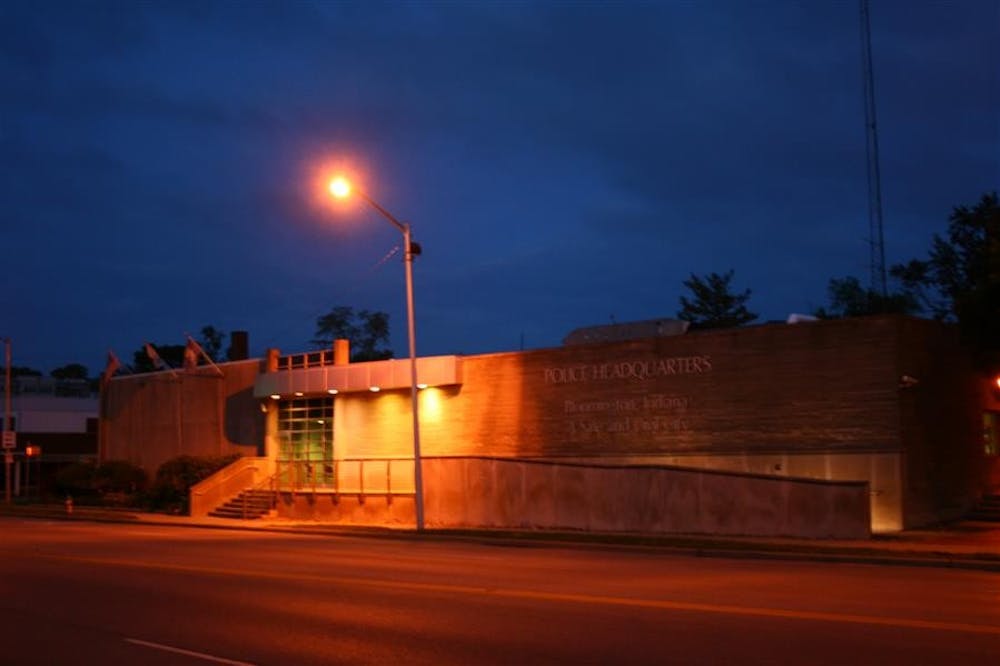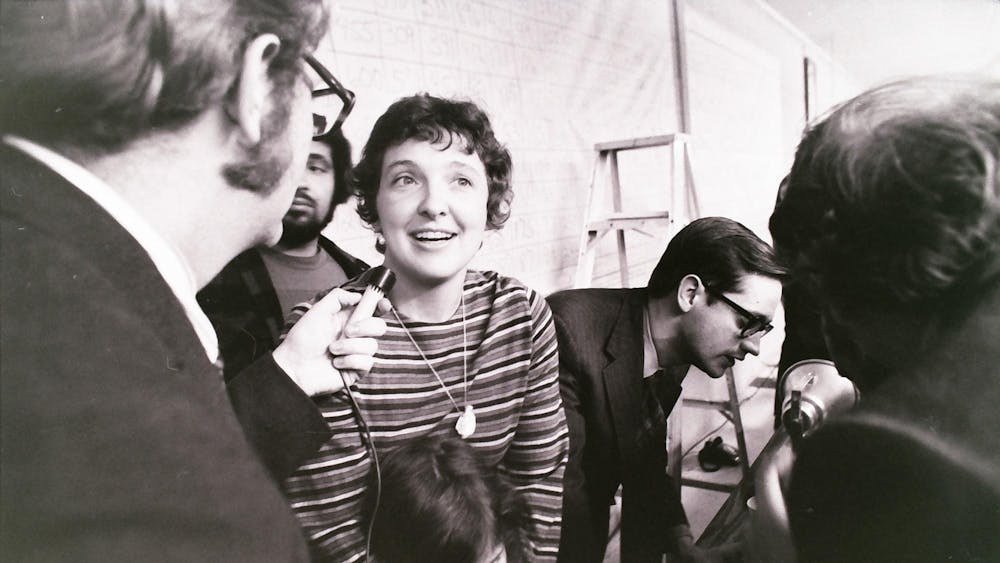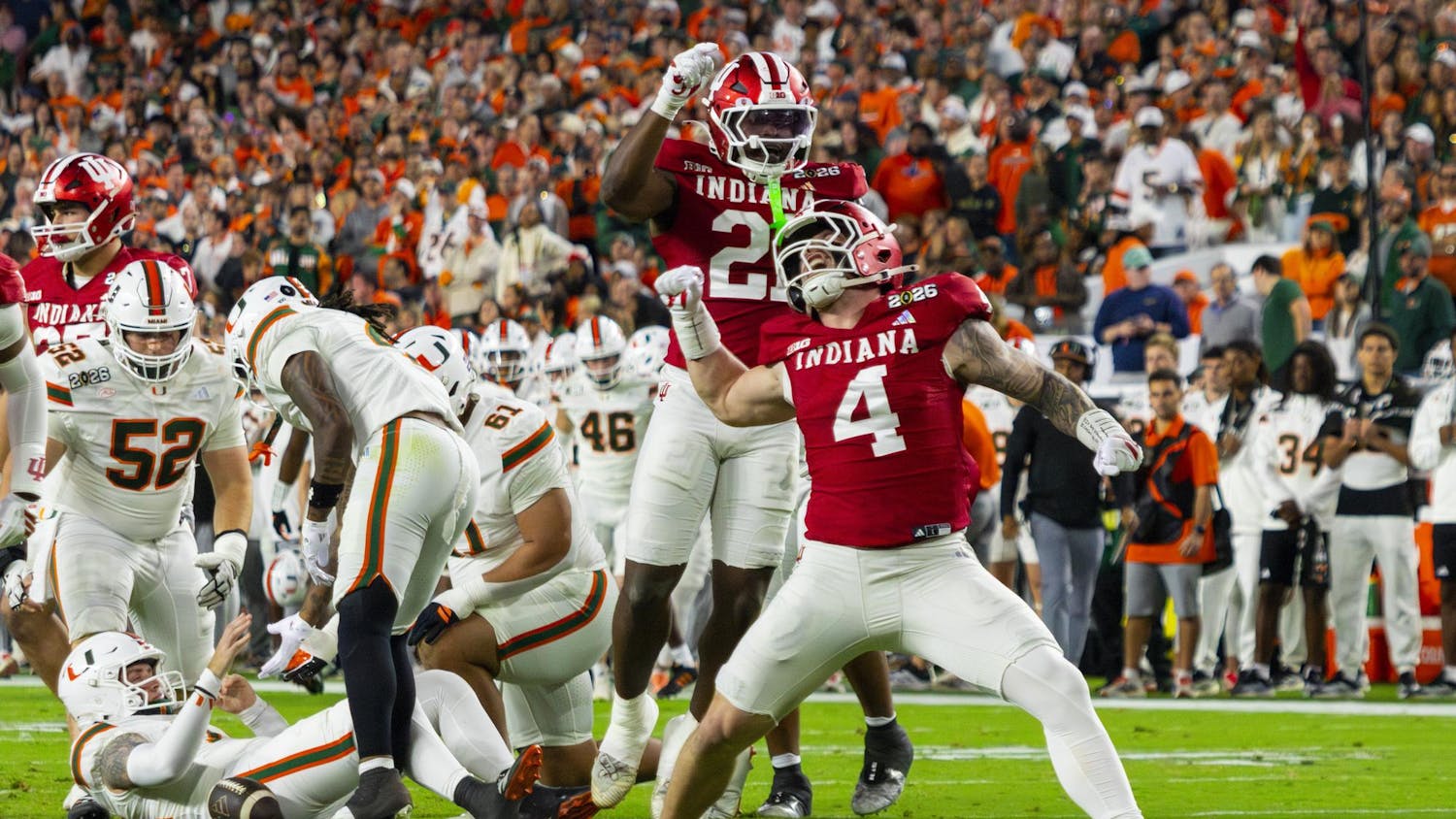As the city did the dishes and anticipated a Friday night out May 31, the officers of the Bloomington Police Department sipped coffee and listened to the IU baseball game on the radio. The night shift was ready for roll call and would stick around to see the city’s residents off to bed.
Their objective? Keeping Bloomington “a safe and civil city.”
An IDS reporter was along for the ride.
* * *
10 p.m.
Officer Jon Hoffmeister has worked the night shift for the entirety of his nine years with BPD. His excitable K-9 companion, Pongo, has joined him for five and is almost ready to retire. Together, they drive the oldest car in the fleet. His 2007 Crown Victoria has driven just more than 106,000 miles, but it has seen better days.
“The K-9s just beat these things up,” Hoffmeister says. “There’s gonna be hair in places where hair shouldn’t be.”
Before their night truly begins, Hoffmeister and Pongo fill up on gas at a police fuel depot on the west side of town. As “Hoffy” steps out to swipe his government ID card, his first call of the night comes through the scanner.
A woman in her 50s has smashed her car through the curb at Village Pantry, going airborne and slashing her tires in the process. Pieces of her lights are still in the parking lot. Witnesses suspect she has been drinking.
Hoffmeister is one block away.
Moments later, the Ellettsville resident has located the suspect: a silver BMW with a smashed right-rear wheel. The side airbags have deployed. He prepares for a barrage of field tests and calls for backup — his K-9 unit vehicle is not equipped for passengers.
“It’s kind of a musical chair thing,” Hoffmeister says with a chuckle. “A lot of the guys don’t like when I get ‘em, because then they have to do ‘em.”
After the suspect’s boyfriend arrives on scene, three more squad cars respond to Hoffmeister in the parking lot of Cresent Donuts. Employees and customers alike gawk from the store’s lobby.
The woman fails all three field sobriety tests. As officers start to handcuff her, Pongo lets out a round of fierce yelps.
“Handcuffs are a trigger,” Hoffmeister says. “He goes nuts when he hears that click. When that first cuff goes on is when fight-or-flight happens.”
Hoffy calms Pongo down before returning to the police station to administer paperwork and a breath test for the suspect. This is the woman’s third impaired driving incident, with others on record in 2004 and 2005.
After a half-hour of questioning, her BAC test comes back more than the .08 legal limit, and the booking process begins. Patiently and somberly, Hoffmeister goes about his duties.
“We’re going to have to handcuff you again to transport you,” he says. “Thank you for being cooperative.”
“No,” she says. “Thank you. Thank you for being fair.”
Click.
11:24 p.m.
Sgt. Ryan Pedigo, in his sixth year at BPD, works at his desk just down the hallway from Hoffmeister. The station is quiet after the sun goes down. The loudest noises are the air conditioner and the occasional printer task. Just outside his office, a sign reminds the officers to “train as if your life depended on it.”
Between a Friday night, the NCAA regional baseball tournament and a high school track and field meet, the BPD officers have their work cut out for them.
Pedigo looks at weather forecasts. Heavy rain and storms are on the way.
“Maybe the weather will help us out,” he says. “People don’t like to raise Cain if it’s pouring outside.”
Though his night begins peacefully at the desk, Pedigo will eventually find himself battling those same elements of nature.
11:45 p.m.
Hoffmeister and Pongo have returned to street patrol, this time touring their usual northwest area route. They embark on “the hill,” an area of low-income housing that started as a place for returning Vietnam veterans, but since devolved into an area of crime and poverty.
“There’s a lot of good people up here, and then there’s a lot of bad people,” Hoffmeister says. “And the bad people like to prey on the good people, unfortunately.”
Hoffy keeps his car slow in the dimly lit neighborhood. Many residents are still out walking from place to place. Quite a few sit on their porch drinking and smoking.
A young girl rides her push scooter just before the stroke of midnight.
“The parents put the kids on their schedule so they can sleep,” Hoffmeister says with a sigh.
Hoffmeister has two children himself. His daughter is 5 years old and understands what he does for a living, but his son is merely 6 months old. Though Hoffmeister has worked the night-shift life for nearly a decade, he stays up after work to eat breakfast and see his kids. After some sleep, he sees them for a bit longer in the afternoon before returning to the night shift.
The officer will not eat again until breakfast, as he refuses to dine on shift. The only places open during his time of duty are late-night diners and gas stations.
“It’s rough on our bodies,” Hoffmeister admits. “I don’t think a lot of us realize that because it’s routine.”
Though the night shift has grown to be Hoffy’s home, the job of being a police officer is demanding regardless of the hour. Hoffmeister responded to a call April 30 along the B-Line Trail that resulted in a suspect committing suicide when presented with a warrant for his arrest.
“You gotta get thick,” he says. “You have to be able to look at a dead body or the worst crime in the world and focus.”
1:27 a.m.
Sgt. Pedigo is in charge.
After starting the night with roll call and desk duties, Pedigo hits the streets to patrol where he chooses. He meets with other officers as backup or searches back alleys for the unexpected. With a large coffee in hand, he juggles three walkie-talkies, a laptop, an earpiece and his cell phone, driving judiciously all the while.
Pedigo creeps his cruiser through a narrow alley near College Mall. He shines the car’s spotlight into a number of businesses closed for the night. There has been a string of burglaries in the area, but he sees nothing unusual tonight.
He carries on to the area of Kirkwood and Walnut streets. The bars will announce last call soon, and the severe thunderstorm front is creeping closer.
2:31 a.m.
Pedigo said he likes to speak with citizens and students downtown after midnight to educate them. He aims to enforce the law, but says he wants people to know the police are there to help, not get people in trouble.
“The guys and gals on this shift, they choose third shift for a reason,” he says.
As he drives by a house party, a number of people on the porch stare at his cruiser. A brief worry fills the area. The crowd lowers its drinks and speaks in a hushed voice.
Pedigo is not interested tonight. He drives on.
“If just by being in the area, the party keeps from being out of control, you’ve accomplished your goal,” he says.
The same cannot be said for the Kirkwood Avenue nightlife. A car has struck the retaining wall of the Dunnkirk bar. An SUV has run over a parking meter. A woman is reportedly on the roof of the Upstairs Pub.
Yet Pedigo focuses on the tasks immediately nearby. Pedigo drives downtown as the wind picks up and lightning begins to flash.
He spots a young woman walking alone on Fourth Street. She is wearing a razor-cut top and short shorts. Thunder cracks nearby. Pedigo angles his cruiser into a parking spot and approaches her.
“Can I talk to you real quick?” he asks. “Where are you going? I saw you walking by yourself.”
She says she lives a block away. She lives alone, but she’s determined to get there. Pedigo calmly tells her to “hustle” in advance of the storm and lets her go.
“Thank you officer,” she says. “I really appreciate you stopping.”
Pedigo advances his car to her apartment complex and waits for her to arrive safely.
The woman reaches home without incident. She never sees Pedigo again, but the sergeant watches her arrive from the shadows of a nearby alley.
As the woman disappears into her apartment complex, the skies open up with force.
3:29 a.m.
Pedigo searches for information about weather debris while driving west on Kirkwood Avenue. There is reportedly a large tree branch in the road.
Looking up, he is seconds away from hitting the massive tree chunk.
He swerves the car to the left, collects his breath and parks the cruiser behind the downed piece of nature.
“I almost bought it there,” he says with a relieved voice.
It is too large to move by himself, so another car comes to direct what little traffic is out in the wee hours of the night.
Few people have business in Bloomington at this hour, especially in the violent weather, but every precaution is taken to clear the roads.
“There becomes a point in the night where the night crew of people in the city, the people that are night owls, go to bed,” he says. “As the sun comes up, you see the early risers get up and go to work.”
But this is the part of the night where Pedigo and his crew have time to thrive, to recollect and step ahead of the game.
His uniform dripping from the rain, Pedigo picks up the streets of Bloomington with his bare hands so the morning traffic will have nothing to worry about. He personally removes a trash can from the middle of Walnut Street, then tosses a stray road cone back into its native parking lot.
4:05 a.m.
The bargoers have gone home, and the city is ready for a brief rest. Hoffmeister and Pongo continue their patrols on the northwest side of town near the hill and the other officers follow suit with their assigned areas.
Pedigo returns to headquarters to continue with his paperwork and desk correspondence. When the sun comes up, he will work off-duty security at Kroger, and then return home for “maybe” five or six hours of sleep.
Another night has gone by, and BPD’s night shift officers have left the city accessible and open for the next morning. If their job is done right, nobody will notice anything.
“When people call us, we must remember that these things are important to them,” Pedigo says. “And it should not be taken lightly.”
Under the lights
The story of Friday’s night shift with the Bloomington Police Dept.

Get stories like this in your inbox
Subscribe





